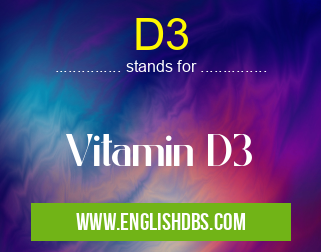What does D3 mean in DRUGS
Vitamin D3 is an essential nutrient for humans, and plays a role in many processes in the body. It is most commonly known for its role in calcium absorption and the maintenance of healthy bones and teeth. Vitamin D3, or cholecalciferol, is one of two forms of vitamin D — the other being vitamin D2 (ergocalciferol). Here is an explanation of what Vitamin D3 is and some common questions about it.

D3 meaning in Drugs in Medical
D3 mostly used in an acronym Drugs in Category Medical that means Vitamin D3
Shorthand: D3,
Full Form: Vitamin D3
For more information of "Vitamin D3", see the section below.
Essential Questions and Answers on Vitamin D3 in "MEDICAL»DRUGS"
What is Vitamin D3?
Vitamin D3, also known as cholecalciferol, is one form of vitamin D that is found naturally in some foods like eggs, fish liver oil, and butter. It can also be made when ultraviolet (UV) radiation from sunlight strikes the skin and triggers vitamin D synthesis.
What are the benefits of taking Vitamin D3?
Some potential benefits associated with taking Vitamin D3 include improving bone health, reducing inflammation, supporting immune function, aiding in calcium absorption, aiding in muscle function and strength, reducing depression symptoms, and protecting against some chronic diseases.
How much Vitamin D3 should I take daily?
The recommended Dietary Allowance (RDA) for adults over 18 years old ranges from 600 to 800 IU per day depending on age. However, individuals may require more or less than this amount based on individual needs or medical conditions. It's best to speak to your doctor before starting a new supplement regimen.
Are there any side effects associated with taking too much Vitamin D3?
Taking too much Vitamin D can lead to an excess of calcium build-up in the blood which can cause nausea and vomiting as well as weakness and confusion. Other more severe symptoms may include kidney stones or abnormal heart rhythms if taken excessively over long periods of time.
Can I get enough Vitamin D from food alone?
While certain foods contain smaller amounts of naturally occurring vitamin D such as salmon, egg yolks and fortified dairy products such as milk; it's often difficult to get enough through diet alone especially during winter months when sun exposure can be limited for those living at farther latitudes.
Final Words:
To ensure proper levels of vitamin d intake it's important to either receive regular sun exposure if possible or supplement with a quality product when needed specifically containing the form -vitamin d 3- due to its superior bioavailability. Although more research still needs to occur surrounding optimal doses it's important to remember individual differences should be taken into account when determining supplementation protocols due to variation between age groups and comorbidities that could exacerbate supplementation side effects if not monitored correctly.
